Thanks to all of you who are avidly following the Katy stories. She would have been delighted to know you. This new entry shares how her family happened to come to America — and why they left their homeland — twice! It’s a brief, interesting bit of Ukraine history and includes a few direct quotes from a taped interview with my mother, Katy, when she was 75. You can find Katy’s stories on the 🌿Leaves home page or by clicking HERE . They are short vignettes that can be read in any order.
“My parents were immigrants from Ukraine. They came to America in 1912. They already had three little boys. During that time, Woodrow Wilson was president. The reason they could come into this country was that my mother’s uncle, Georg, was already living in North Dakota and he helped them. They had to have someone here who would sponsor them, or they couldn’t get into the country . They didn’t speak any English, but my uncle helped them get settled. I wasn’t even born yet.”
Katy’s distant ancestors were ethnic Germans, living in Alsace and Baden Würtemberg well-before a unified Germany existed. In the mid-1700s, German farmers and tradespeople in the smaller German city-states were a downtrodden mess — demoralized by years of religious contention, political chaos and utter poverty.
Then in 1763, they received an irresistible invitation from the Russian Czarina, Catherine, a former Prussian German princess. If Germans would immigrate to Russia, she promised, they would be given free farmland and the right to govern themselves. She promised them special economic and political privileges and the freedom to practice their own religion. Her invitation was a siren’s call to the people of the smallest, most oppressed German city-states, an offer they couldn’t refuse. My ancestors leapt at the opportunity, and went on to live in Ukraine for four generations.
Altogether, more than 100,000 Germans accepted the Czarina’s offer. They settled in colonies along the Volga, in the Ukraine near the Black Sea and to the west of Kiev. They named their small, insular settlements and villages after the German towns they came from — Elsass, Baden, Selz, Mannhein.
The colonists built homes and churches, and began extensive planting of grains, sunflowers, vegetables, fruits, tobacco. They worked as beekeepers, foresters, and sheep herders. They established brick yards, wineries, breweries, cheese factories, mills and horse breeding farms. Over the years, they realized every dream they were promised and, in turn, Russia as a whole became more developed and prosperous.
Of course they soon found nothing is ever really free or forever. Promises are easily rescinded. In 1874, Czar Alexander II instituted a universal military draft for the Russian Imperial Army, which included the German colonists. They soon found themselves forced to fight in wars against their own people in Germany.
“Uncle Melchior was one of our family who was drafted. He refused to go fight in Germany and kill Germans, so he deserted. But his wife turned him in to the militia - she told them where he was hiding. He was shot in a firing squad. It was a huge scandal. I think she must not have wanted him around any more. Maybe she wanted that farm all to herself. Or maybe she had another man she liked better? There was lots of family gossip.”
In the 1890s, the Czar took over the colonists' schools forbidding them to use the German language, and they usurped their right to self-govern. Treasuring their own identity and culture, Germans in Russia began emigrating to North America. They settled through the Great Plains from Saskatchewan to Texas in order to preserve their distinct heritage across borders and generations.
In 1912, Michael and Marion and their three sons took a train from Odessa to Bremen, where they boarded the USS Chemnitz for the nine-day Atlantic crossing. It was scheduled to take them to New York, but actually took them on to Philadelphia for debarkation. Lost and confused as they were, they somehow made their way by train to the small town of Minot, North Dakota. How they ever managed it alone with three small children and no English is beyond imagination.
Katy told us as much as she knew about her parents’ early years in the US, which sadly, was very little:
“My folks lived in the town of Harvey, where my Uncle Georg lived, for 13 years. Dad got a job working on the Soo Line railway. Four of us kids were born in Harvey – three brothers and me. So there were seven kids and mom and dad. But one baby brother died. I was really young, but I remember we had a pretty nice house in Harvey. It actually had an indoor toilet which seemed very fancy to us. Anyway, it turned out that my three older brothers just kept getting into trouble all the time — in school and in the streets. They were real rounders, getting in fights, and stealing and all. And my parents decided they needed to get them out of the town, and move them to the country. Dad bought a farm just outside of Esmond in about 1925. Uncle Georg loaned him the money. Those boys were put to work on the farm real hard, but, you know, they still got into trouble. They were just wild boys.”
Katy told us a lot of stories about her older brothers who were somewhat feral – they were ill-mannered and all three were expelled from school. She and her two younger brothers seemed to be mostly bewildered and shy, doing what they were told and keeping the wrath of their stern father at bay. They all dearly loved their Uncle Georg, who was, apparently, a very cultured and civilized man. He showed them great kindness. The stories of Katy’s farm life, school days, problems with her dad and her brothers, and, ultimately, her escape from a bad situation at 16, are already in the Katy Stories archive. She had quite a bold life.
Katy never knew her grandparents or the older family members who stayed in Ukraine. She never knew the land they’d tilled, the air they’d breathed in their ancestral homeland. She never knew any of her Ukrainian heritage; the cord had been severed. Which is true for most of America’s immigrants of the time.

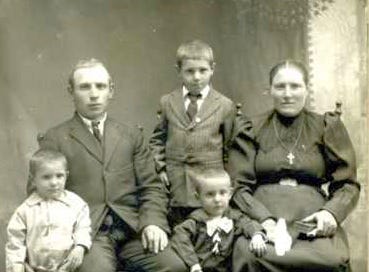



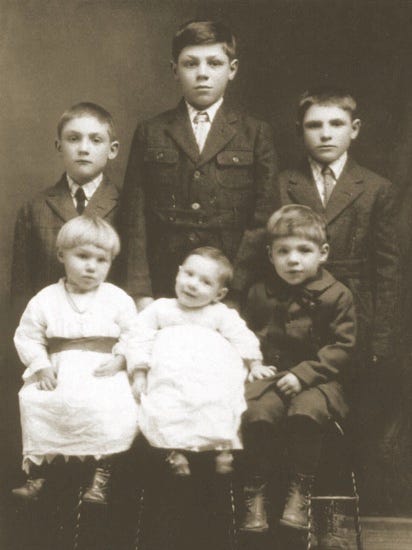

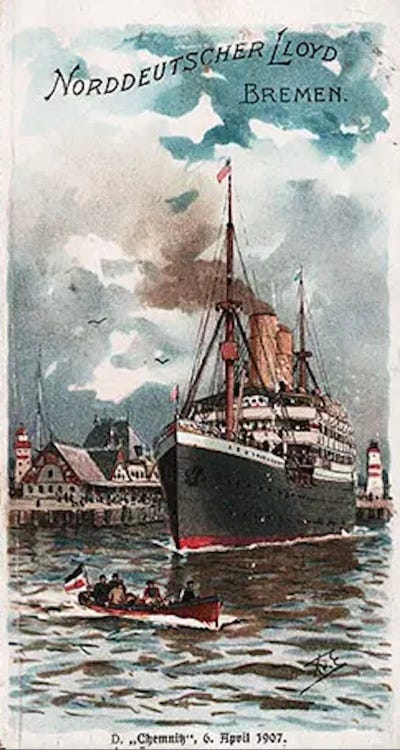
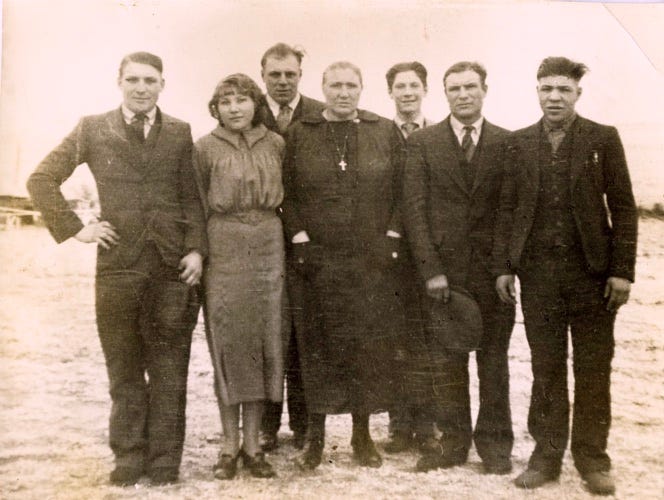
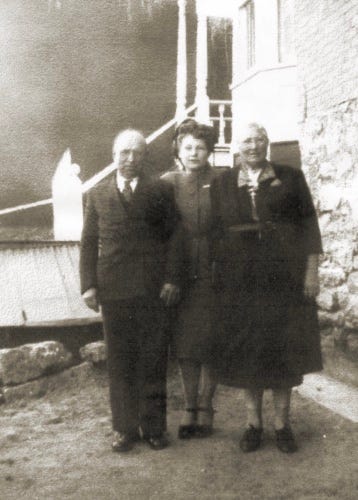

Precious family history. Great you have those photographs. Means a lot because, you know, I’m your brother 🤗😘
Hi Sharron,
How fortunate you are to have those stories and pictures. The one of Katy and her parents reminded me of my grandparents.